
Leelanau County is a county located in the U.S. state of Michigan. As of the 2020 census, the population was 22,301. Since 2008, the county seat has been located within Suttons Bay Township, one mile east of the unincorporated village of Lake Leelanau. Before 2008, Leelanau County's seat was Leland. Leelanau County is included in the Traverse City metropolitan area of Northern Michigan. The largest settlement in Leelanau County by population is Greilickville, itself a suburb of Traverse City.
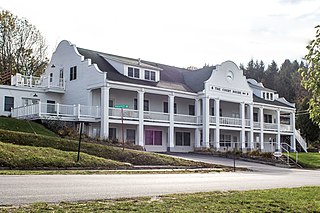
Benzie County is a county in the U.S. state of Michigan. As of the 2020 census, the population was 17,970. The county seat is Beulah. The county was initially set off in 1863 and organized in 1869. At 321 square miles (830 km2), Benzie County is the smallest of the 83 counties in Michigan in terms of land area.

Sleeping Bear Dunes National Lakeshore is a U.S. national lakeshore in the northwestern Lower Peninsula of Michigan. Located within Benzie and Leelanau counties, the park extends along a 35-mile (56 km) stretch of Lake Michigan's eastern coastline, as well as North and South Manitou islands, preserving a total of 71,199 acres. The park is known for its outstanding natural features, including dune formations, forests, beaches, and ancient glacial phenomena. The lakeshore also contains many cultural features, including the 1871 South Manitou Island Lighthouse, three former stations of the Coast Guard, and an extensive rural historic farm district.
The Leelanau Peninsula is a peninsula of the U.S. state of Michigan that extends about 30 miles (50 km) from the western side of the Lower Peninsula of Michigan into Lake Michigan, forming Grand Traverse Bay. It is often referred to as the "little finger" of the mitten-shaped lower peninsula. The peninsula is a tourist hotspot, especially due to the popularity of Sleeping Bear Dunes National Lakeshore, which adorns the southwestern coast of the peninsula. The peninsula is also largely agricultural, and is a production hotspot for cherries and wine.
The following is a list of Registered Historic Places in Grand Traverse County, Michigan.
This National Park Service list is complete through NPS recent listings posted October 4, 2024.

This is a list of the National Register of Historic Places listings in Leelanau County, Michigan.
McFarland House or MacFarland House may refer to:
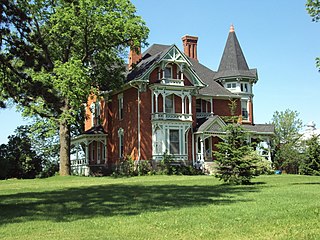
The George B. Horton and Amanda Bradish Farmstead is a privately owned farmhouse that sits on 40 acres of land at 4650 West Horton Road in rural Fairfield Township in Lenawee County, Michigan. It was added to the National Register of Historic Places on February 1, 2007. There are several other buildings on the property, but the main farmhouse was built in 1888 in Queen Anne Style.
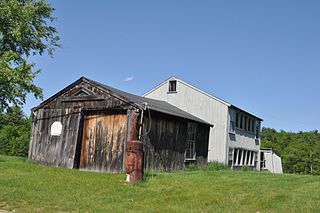
Lamson Farm is a historic farm property on Lamson Road in Mont Vernon, New Hampshire. Founded in the 1770s and operated as a farm until 1975, it is one of the few surviving intact 19th-century farm properties in the community. Its land, over 300 acres (120 ha) in size, is now town-owned conservation and farmland. The property has trails open to the public, and an annual celebration of Lamson Farm Day is held here every September. The property was added to the National Register of Historic Places in 1981.

The Franklin Harris Farmstead is a historic farm complex located outside the village of Salem in Columbiana County, Ohio, United States. Once home to a prominent former soldier, the farmstead includes a high-style farmhouse from the 1890s, and it has been named a historic site.

The Parker Hill Rural Historic District encompasses a large rural agricultural landscape in eastern Windham and Windsor counties in the US state of Vermont. Roughly centered on Parker Hill Road in northern Rockingham and southern Springfield, the district exhibits a history of 200 years of farming, including a collection of Federal period farm housing. The district was listed on the National Register of Historic Places in 1993.
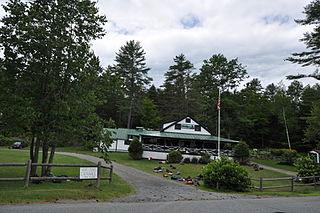
Aloha Horizons Camp is a summer camp for boys and girls on Lake Fairlee in West Fairlee, Vermont. Opened in 1921 as Camp Wyoda, its property was acquired by the Aloha Foundation in 1997, and is now operated by that organization as a day camp for local children and vacationers staying in the area. Camp is divided into three two-week sessions; activities include water sports, land sports, and arts and crafts. The camp property, organized around a former farmstead, was listed on the National Register of Historic Places in 2003 for its well-kept collection of surviving early camp architecture.

The Isaac M. Raymond Farm, now Uphill Farm, is a historic farm property on North Bridgewater Road in Woodstock, Vermont, United States. The farm is the reduced core of a larger farm property accumulated in the first half of the 19th century by Isaac Raymond, and revived as a gentleman's farm in 1940. The property includes an altered 1805 Cape style farmhouse and 20th-century Colonial Revival farm buildings. It was listed on the National Register of Historic Places in 1993.

The Jacob and Rebecca Fuerst Farmstead was a farm located at 24000 Taft Road in Novi, Michigan. It was listed on the National Register of Historic Places in 1997. The farm was demolished in 2008 and the property redeveloped into Fuerst Park.

The Alonzo W. Olds House, also known as the Albert Read House, is a single family home located at 10084 Rushton Road in Rushton, Michigan. It was listed on the National Register of Historic Places in 1972.

DeLano Farms is a working educational farm, located at 555 West E Avenue, north of Kalamazoo, Michigan. The farm is the western portion of the Kalamazoo Nature Center, and contains the historic William S. Delano House and associated farmstead. The house was listed on the National Register of Historic Places in 1979.

The Fanckboner-Nichols Farmstead is a farmhouse and associated buildings located at 5992 West VW Avenue in Prairie Ronde Township, Michigan. It was listed on the National Register of Historic Places in 2007.
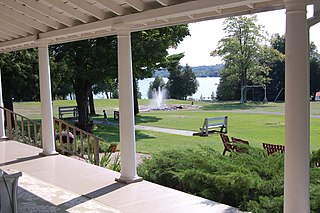
Fountain Point Resort is a historic landmark located on the eastern shore of South Lake Leelanau in Suttons Bay Township, Michigan. Its name is derived from a fountain of sparkling artesian spring water, situated on a large point on Lake Leelanau, which has been continuously gushing since 1867.

The Walker, Combs, Hartshorne, Oakley Farmstead is located in the historic district of the village of West Freehold, a part of Freehold Township in Monmouth County, New Jersey, United States. The house was built in 1686 and was added to the National Register of Historic Places on October 14, 1990.

The Port Oneida Rural Historic District is a historic district located along M-22 between Glen Arbor and Lake Leelanau in Leelanau County, Michigan. It was listed on the National Register of Historic Places in 2017.





















